 |
||||||
 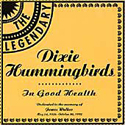 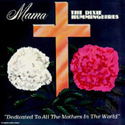 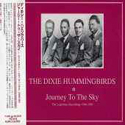 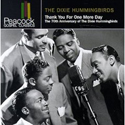 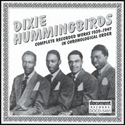 Click speaker button below to turn slide show audio off Click audio / video clip above to hear additional audio
|
||||||
| The Dixie Hummingbirds (Inducted 2000) The Dixie Hummingbirds are probably the best known of the black gospel quartets, having performed for over 50 years throughout America and Europe. They became the inspiration for countless R&B and soul singers, from Jackie Wilson and Clyde McPhatter to Bobby “Blue” Bland and The Temptations. |
||||||
The Dixie Hummingbirds with their Harmony Awards at The Vocal Group Hall of Fame Induction Ceremony. |
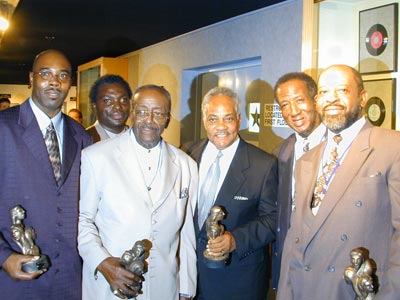 |
|||||
Tucker had been influenced by the Norfolk Jubilee Singers, and his mixture of gospel and blues added a versatility to the Dixies’ style that helped make them leading black Southern quartet. As time went on he developed his showmanship, becoming the first to run up and down the aisles and jump off stages; it’s very possible that James Brown learned the moves from Tucker. The Hummingbirds began on Philadelphia radio at station WCAU as the Jericho Boys and the Swanee Quintet, and performed in packed stadiums without the benefit of a hit record. In 1945 the group recorded for Apollo and then Gotham. In 1966 the Hummingbirds performed at the Newport Folk Festival and were an instant sensation. Seven years later they backed Paul Simon on his gospel-flavored composition, “Loves Me Like a Rock.” The record sold a million copies and reached number two in the late summer. Soon after, the group recorded its own version. The Hummingbirds continued into the ‘80s with a number of personnel changes. James Davis retired in 1984 after 56 years on the circuit. Willie Bobo died in 1976. Ira Tucker and James Walker were still featured as of the late ‘80s. ~Jay Warner A pioneering force behind the evolution of the modern gospel quartet sound, the Dixie Hummingbirds were among the longest-lived and most successful groups of their era; renowned for their imaginative arrangements, progressive harmonies and all-around versatility, they earned almost universal recognition as the greatest Southern quartet of their generation, and their influence spread not only over the world of spiritual music but also inspired secular artists ranging from Jackie Wilson to Bobby "Blue" Bland to the Temptations. Formed in Greenville, South Carolina by James B. Davis, the Dixie Hummingbirds began their career during the late '30s as a jubilee-styled act; joined in 1938 by 13-year-old baritone phenom Ira Tucker and bass singer extraordinaire Willie Bobo, a former member of the Heavenly Gospel Singers, the group made their recorded debut a year later on Decca, where they issued singles including "Soon Will Be Done with the Troubles of This World," "Little Wooden Church" and "Joshua Journeyed to Jericho." After earning a standing ovation for their performance at the 1966 Newport Folk Festival (captured on the Gospel at Newport LP), the Hummingbirds essentially retired from mainstream appearances to focus solely on the church circuit. They did, however, burst back into the popular consciousness in 1973, backing Paul Simon on his pop smash "Loves Me Like a Rock." The death of Willie Bobo in 1976 brought to a sad end a lengthy chapter of the Hummingbirds' history — his membership in their ranks dated back to the late 1930s — but the surviving members forged on; just two years later, Ebony Magazine named them "The World's Greatest Gospel Group." After Davis retired in 1984, Tucker was the last remaining link to the quartet's formative years; despite the subsequent deaths of Walker in 1992 and Thompson in 1994, Tucker continued leading the group at the century's end, recruiting new blood to keep the Dixie Hummingbirds' spirit alive for years to follow, celebrating their seventh decade with 1999's Music in the Air: The 70th Anniversary All-Star Tribute.
|
||||||
| Discography - A Side / B Side | Label / Cat No. |
Date |
||||
| I Know I’ve Been Changed / Trouble In My Way Lord If I Go / Eternal Life Let’s Go Out To The Programs / I’ll Keep On Living After I Die Live Right, Die Right / Prayer Wheel Christian Testimonial / Will The Lord Be With Me? I’m Not Uneasy / Sinner, Sin No More It Must Have Been The Lord (That Touched Me) / Take Care Of Me Poor Pilgrim Of Sorrow / Devil Can’t Harm A Praying Man Troubles Will Be Over / Way Up On High Thank You Lord For One More Day / Get Right Church Loving Hand / Cool Down Yonder Live On Forever / Just Trusting Christian’s Automobile / Stop By Here Walls Of Zion / Just A Little While I Don’t Know Why (I Have To Cry Sometime) / Let’s Go Out To The Programs No. 2 Make One Step / Come On And See About Me Nobody Knows The Troubles I See / The Final Edition I Want To Feel The Holy Spirit / What A Friend Jesus Hold My Hand / Leave Your Burdens There He Cares For Me / God’s Goodness Have A Little Talk With Jesus / In The Morning Our Father’s Children / Bedside Of A Neighbor Another Day / If You Trust Him Come Ye Disconsolate / Our Prayer For Peace Lord I Come To Thee / If Anybody Asks You Prayer For The Sick / You Don’t Have Nothing The Old Time Way / Gabriel Only Jesus / Confidential God Your Good Deeds / What The Lord Is To Me The Inner Man / I’m Going On God Is Going To Get Tired / Don’t Let Me Fall Payday / Somebody Somebody Is Lying / Lord, If You Don’t Help Us Love Me Like A Rock / I’ve Been Born Again Come Ye Disconsolate / Our Prayer For Peace |
Pcok 1705 Pcok 1713 Pcok 1722 Pcok 1727 Pcok 1736 Pcok 1740 Pcok 1742 Pcok 1757 Pcok 1763 Pcok 1764 Pcok 1770 Pcok 1773 Pcok 1780 Pcok 1783 Pcok 1788 Pcok 1791 Pcok 1803 Pcok 1808 Pcok 1817 Pcok 1831 Pcok 1844 Pcok 1861 Pcok 1889 Pcok 3012 Pcok 3045 Pcok 3073 Pcok 3084 Pcok 3098 Pcok 3109 Pcok 3148 Pcok 3165 Pcok 3179 Pcok 3191 Pcok 3198 Pcok 3402 |
1952 1953 1953 1954 1954 1/55 1955 1955 1956 1956 1956 1957 11/57 1958 1958 1959 1959 1959 1959 1961 1962 1962 1962 1964 1965 1965 1965 1966 1967 1968 1968 1968 1968 1968 1968 |
||||
 |
||||||